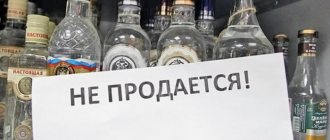5.What consequences can there be in the case of illegal trade in alcohol and tobacco products?
Illegal trade in alcohol
When plotting illegal actions, many defendants think that they will not face criminal sentences. At least they certainly won't get caught. But, as practice shows, law enforcement agencies are not asleep. And the media is replete with criminal cases from different regions of our country.
Thus, in one of the cases, members of an organized group planned to purchase illegal alcoholic beverages, covered with obviously counterfeit federal special stamps, or without them, on the territory of the Russian Federation, at reduced prices, with delivery of the purchased alcoholic beverages to garages. The result of illegal trade was a very real criminal sentence under paragraph “a” of Part 6 of Art. 171.1 of the Criminal Code of the Russian Federation and paragraph “a”, part 2 of Art. 171.3 of the Criminal Code of the Russian Federation (Sentence of the Sharypovsky City Court (Krasnoyarsk Territory) dated September 17, 2020 No. 1-121/2019 1-3/2020).
At the end of January 2021, police discovered 8 tons of unlabeled alcohol in Stary Oskol. The 50-year-old suspect rented premises and stored about 8 tons of alcohol in them, poured into cans and bottles. According to preliminary data, the man sold the products at retail and in small wholesale quantities through friends. A criminal case has been initiated under Part 5 of Art. 171.1 of the Criminal Code of the Russian Federation. The perpetrator faces up to 3 years in prison.
And in March 2021, Volgograd police officers detained suspects in the possession, acquisition, transportation and sale of alcoholic beverages without labeling. Income from illegal activities amounted to almost 14 million rubles. Operatives conducted searches in the company's office, retail outlets and 2 rented warehouse premises. Over 52,000 liters of brewing products were seized without labeling and information about the manufacturer, composition and other characteristics of the product. A criminal case has been initiated under Part 4 of Art. 171.1 of the Criminal Code of the Russian Federation. A preventive measure was chosen for the attackers in the form of a ban on certain actions.
Illicit trade in tobacco products
The sale of unmarked cigarettes is also an object of making illegal profit. Not long ago, in the Moscow region, more than 1 million packs of unmarked tobacco products were seized from illicit trafficking and members of an organized group who were selling them were detained. During searches, computers, telephones, seals and stamps, as well as over a million packs of well-known brands of cigarettes with a total value of over 180 million rubles were confiscated from suspects and warehouses in Moscow and the Moscow region. A criminal case has been initiated under paragraph 6 of Article 171.1. Criminal Code of the Russian Federation. The sanction of the article provides for a penalty of six years in prison.
Key Concepts
For a better understanding of the mechanism of how counterfeit is pursued by the Criminal Code of the Russian Federation, it is advisable to start with basic concepts:
- Excise duty is a type of tax levy levied on monopoly goods with a high degree of profitability.
- Excise stamps are used to mark products subject to excise duty.
- Special stamps indicate the legal origin of the product.
- The mark of conformity is another type of marking that confirms that the purchased product meets the required standards.
The production and use of counterfeit brands and signs is punishable by criminal law. Goods sold in Duty free stores are exempt from paying excise duty.
The disposition of the legal norm under consideration does not name specific signs of an atrocity, but refers to other normative legal acts to establish them.
The Code of Administrative Offenses provides for punishment for the same acts under Art. 15.12 Code of Administrative Offences. The difference between an administrative offense and a criminal offense lies in the amount of damage caused.
The subject of the offense is the entire assortment, which is subject to mandatory labeling. This also includes alcohol and tobacco products, jewelry, precious stones, some types of raw materials and more. The presence of an excise stamp on the packaging gives the buyer a guarantee of the legality of its origin. In our country, excise taxes are imposed only on a certain group of goods - alcohol with an ethyl alcohol content of over 9%, tobacco. In addition, imports imported from the CIS countries are marked with a conformity mark, which means that the products meet the required quality standards.
The objective side of the offense has several forms of expression. For example, the production of counterfeit goods, its acquisition, sale or distribution, as well as transportation.
Often difficulties with the qualification of a crime arise when determining the subjective side, when proving intent. At the same time, the intent must consist of the person’s desire to sell prohibited products. If intent is not proven, the actions of the accused will be classified as illegal business.
The subject is an individual or a group of individuals who have organized a sales line for counterfeit products. For committing a crime provided for by the rule of law in question, there is a rather severe punishment.
In the current version, the legislator has provided for the following types of criminal liability:
- fine;
- a fine in the amount of wages or other income for a certain period;
- imprisonment for up to 6 years;
- forced labor.
In addition, the court may impose a combined sentence. The size of the fine, the term of imprisonment and the amount of forced labor vary depending on the qualification of the criminal act. The legislator identifies the commission of this offense by an organized group, as well as on a particularly large scale, as qualifying circumstances.
The main problem with the application of the legal norm in question is the lack of consensus regarding the object of the crime. Most often, an object is understood directly as the process of manufacturing and circulation of products, which are marked in the prescribed manner in the course of business activities.
6.What does the coming day have in store for us?
At the time of recording the video, draft Federal Law No. 972623-7 was adopted by the State Duma in the first reading (02/10/2021).
It changes the punishment for violating the rules of labeling of medicines and other goods.
Now the production and sale of drugs with or without labeling violations will cost an official a fine of 5 thousand to 10 thousand rubles, and a company - from 50 thousand to 100 thousand rubles. The unmarked goods themselves will be confiscated.
A similar penalty (not currently available) is planned to be introduced for the putting into circulation, as well as the purchase, sale or other transfer that is not related to the putting into circulation of unlabeled goods (except for medicines).
In case of repeated violation, the fine is doubled :
- for company officials - from 10 thousand to 20 thousand rubles;
- for companies - from 100 thousand to 500 thousand rubles or business suspension for up to 90 days.
Unmarked items will also be confiscated.
The bill proposes to introduce liability for repeated commission of actions in the form of confiscation of the instrument of the crime - production equipment that was used to manufacture unmarked goods subject to mandatory labeling.
Commentary to Art. 14.17 Code of Administrative Offenses
1. The object of the offense is public relations in the field of compliance with the established procedure for the production and circulation of ethyl alcohol, alcoholic and alcohol-containing products.
Legal regulation of this area of relations is carried out through
— federal laws;
— regulatory legal acts of the Russian Federation;
— laws of constituent entities of the Russian Federation, adopted in accordance with the above federal laws and regulatory legal acts of the Russian Federation;
— regulatory legal acts of the constituent entities of the Russian Federation, adopted in accordance with the above federal laws and regulatory legal acts of the Russian Federation.
At the same time, the key federal law is the Federal Law of November 22, 1995 N 171-FZ “On state regulation of the production and circulation of ethyl alcohol, alcoholic and alcohol-containing products” and other regulatory legal acts adopted in accordance with it, establishing a special procedure for production and circulation ethyl alcohol (see also Government Decree No. 494 of July 4, 2002 “On trademarks for alcohol and alcohol-containing products”).
Production of ethyl alcohol, alcoholic and alcohol-containing products is the production of such products by an organization for the purpose of selling it and making a profit, as well as for its own needs.
Organizations engaged in the production of ethyl alcohol, alcoholic and alcohol-containing products and using for these purposes the main technological equipment manufactured both on the territory of the Russian Federation and outside its territory are required to have a certificate of conformity for the specified equipment and a positive conclusion of the state environmental examination, issued in accordance with the procedure established by the legislation of the Russian Federation.
The production of ethyl alcohol has the right to be carried out by state-owned enterprises, as well as other organizations that have a paid-up authorized capital (authorized capital) of at least 10 million rubles.
Purchasing is a form of organized acquisition of products, raw materials and food from commodity producers (suppliers) for subsequent processing or sale to the consumer (buyer) on mutually beneficial contractual terms.
The purchase of ethyl alcohol for the production of alcoholic beverages and alcohol-containing products and (or) use for one’s own needs is subject to the submission of a notification.
Deliveries of ethyl alcohol, alcoholic and alcohol-containing products for federal state needs are carried out in accordance with the legislation of the Russian Federation on the supply of products for federal state needs.
From January 1, 2006, the Federal Law of May 6, 1999 N 97-FZ “On competitions for placing orders for the supply of goods, performance of work, provision of services for state needs”, which regulated the relations that arose between the organizer (state customer) and competition participants (suppliers (performers)) during the process. The state customer placed orders for the supply of goods, performance of work, provision of services for public needs through competitions, unless otherwise provided by law (see the preamble of the Federal Law of May 6, 1999 N 97-FZ “On competitions for placing orders for the supply of goods, performance of work, provision of services for government needs”).
Currently, the legislation on placing orders is based on the provisions of the Civil Code of the Russian Federation, the Budget Code of the Russian Federation and Federal Law of July 21, 2005 N 94-FZ “On placing orders for the supply of goods, performance of work, provision of services for state and municipal needs”, which came into force on January 1, 2006.
2. The objective side of this offense consists of committing the following illegal actions:
industrial production of ethyl alcohol in volumes exceeding quotas (Part 1 of the commented article);
supply of ethyl alcohol from raw materials of all types to an organization that does not have quotas for the purchase of ethyl alcohol, or in volumes exceeding quotas (Part 2 of the commented article);
purchase of ethyl alcohol from raw materials of all types by an organization that does not have quotas for the purchase of ethyl alcohol, or in volumes exceeding quotas (Part 3 of the commented article);
industrial production or circulation of ethyl alcohol, alcoholic and alcohol-containing products without an appropriate license, as well as in violation of the conditions provided for by the license (Part 4 of the commented article).
In practice, there are cases of bringing to administrative responsibility for carrying out retail trade in alcoholic products without a license to trade in these products under Part 4 of Art. 14.17 of the Code of Administrative Offenses of the Russian Federation, which indicates that such offenses are incorrectly classified by both tax authorities and courts.
In accordance with the letter of the Ministry of the Russian Federation for Taxes and Duties dated April 30, 2004 N 14-2-03/2023 “On the practice of consideration by courts of cases in the field of production and circulation of ethyl alcohol, alcoholic and alcohol-containing products”, when applying the commented article, one should take into account, that in accordance with paragraph 10 of the Resolution of the Plenum of the Supreme Arbitration Court of the Russian Federation dated January 27, 2003 No. 2 “On some issues related to the implementation of the Code of the Russian Federation on Administrative Offences”, the application of administrative liability measures for retail trade in alcoholic beverages without a license for the right to trade these products is made on the basis of Part 3 of Art. 14.16 Code of Administrative Offenses of the Russian Federation.
3. The subjects of this offense are legal entities (organizations), regardless of their organizational and legal forms and forms of ownership, and their officials.
4. The subjective side of the offense is characterized by guilt in the form of intent or negligence.





